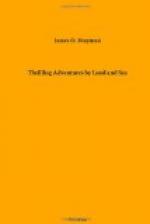All my preparations had been made beforehand; relays of bullocks were posted for me at convenient intervals, and I arrived at Goodaloor, a distance of a hundred and ten miles, in rather more than forty eight hours.
Goodaloor is a quiet little village, about eleven miles from Coimbatore;—but don’t suppose I was going to spend my precious three weeks there.
All loaded, and pony saddled, let us start: the two white cows and their calves; the mattress and blanket rolled up and carried on a Cooly’s head Shikaree, horsekeeper, and a village man, with the three guns, while I, myself, bring up the rear. Over a few ploughed fields, and past that large banian tree, the jungle begins.
In a small clump of low jungle, on the sloping bank of a broad, sandy watercourse, the casual passer-by would not have perceived a snug and tolerably strong little hut—the white ends of the small branches that were laid over it, and the mixture of foliage, alone revealing the fact to the observant eye of a practiced woodman. No praise could be too strong to bestow on the faithful Shikaree; had I chosen the spot myself, after a weeks’ survey of the country, it could not have been more happily selected.
To the deeply-rooted stump of a young tree on the opposite bank, one of the white cows had been made fast by a double cord passed twice around her horns. Nothing remains to be done: the little door is fastened behind me, the prickly acacia boughs are piled up against it on the outside, and my people are anxious to be off.
The poor cow, too, listens with dismay to the retreating footsteps of the party, and has already made some furious plunges to free herself, and rejoin the rest of the kine, who have been driven off, nothing loth, toward home. Watch her: how intently she stares along the path by which the people have deserted her. Were it not for the occasional stamp of her fore leg, or the impatient side-toss of the head, to keep off the swarming flies, she might be carved out of marble. And now a fearful and anxious gaze up the bed of the nullah, and into the thick fringe of Mimoso, one ear pricked and the other back alternately, show that instinct has already whispered the warning of impending danger. Another plunge to get loose, and a searching gaze up the path; see her sides heave. Now comes what we want—that deep low! It echoes again among the hills: another and another. Poor wretch! you are hastening your doom; far or near, the tiger hears you—under the rock or thicket, where he has lain since morning, sheltered from the scorching sun, his ears flutter as if they were tickled every time he hears that music; his huge, green eyes, heretofore half closed, are now wide open, and, alas! poor cow, gaze truly enough in thy direction; but he has not stirred yet, and nobody can say in what direction giant death will yet stalk forth.
The moon is up—all nature still; the cow, again on her legs, is restless, and evidently frightened. Oh! reader, even if you have the soul of a Shikaree, I despair of being able to convey in words a tithe of the sensations of that solitary vigil: a night like that is to be enjoyed but seldom—a red-letter day in one’s existence.




